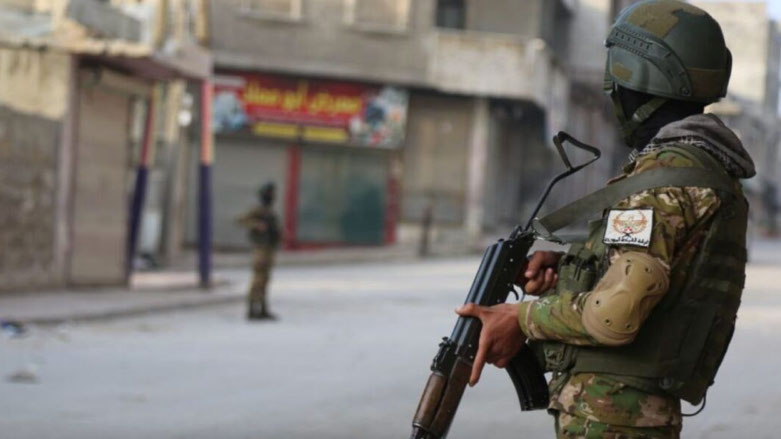Kurdish civilians are being doubly victimized by Turkish-backed groups in Syria: UN report

ERBIL (Kurdistan 24) – The latest report by the United Nations Independent International Commission of Inquiry on Syria released on Wednesday says Kurdish civilians in areas now controlled by the Turkish-backed Syrian National Army (SNA) “are being doubly victimized” for being first conscripted by Kurdish forces, and now arrested by Turkish-backed groups.
“Having first been forcibly conscripted by the Kurdish People’s Protection Units (YPG), including as children, or connected with the Kurdish self-administration, without a choice when they controlled the area until 2018, they are now being arrested and detained by the Syrian National Army,” the report said.
The report mentioned that in early January, near Bab, the Hamza Division of the Syrian National Army (Division 23) arrested a former YPG member, who had been forcibly conscripted in the past.
“The family was only able to locate the victim three months after his arrest, by paying bribes to secure his transfer to Maratah prison in Afrin, controlled by the Syrian National Army military police,” the report said.
Read More: Kurdish-led forces in northern Syria ease conscription conditions
Since November 2014, the Kurdish-led authorities in northeast Syria have enforced military conscription for military-aged men of all ethnicities.
Increase in arrests
The report also noted that the Military police and brigades of the SNA continued to arrest individuals with alleged ties to the YPG, including those who had been forcibly conscripted by the Kurdish YPG, the self-administration, or with the Syrian government or ISIS.
“Interviewees stated that such arrests have been increasing since 2021, following investigations by Syrian National Army military police into people’s alleged role in support of the self-administration, either in a military or civilian capacity, authorized by military courts in Afrin.”
While the Syrian National Army told the UN Commission that they have a “legal system in place fully protects civilians against violations”, interviewees told the UN Commission that people arrested by Turkish backed-groups were held incommunicado for periods ranging from one month to three years.
Moreover, “family members were denied information about the whereabouts of detainees, including detainees transferred to Türkiye.”
Also “family members seeking information on the fate or whereabouts of loved one were also threatened or arrested.”
Sexual violence
@UNCOISYRIA press conference live: https://t.co/ZZ7qNfEXWn Commissioner Lynn Welchman: "Women & girls are disproportionately affected by consequences of enforced disappearances, and also subjected to gendered abuses&violations of their rights." Report: https://t.co/fMIt2TDc1q pic.twitter.com/XPe3ygy6hK
— UN Syria Commission (@UNCoISyria) September 14, 2022
The report also said there were “new credible accounts were also gathered from both male and female survivors, including from minors, of beatings and other forms of torture by members of the Syrian National Army, including rape and other forms of sexual violence that took place in makeshift detention facilities between 2018–2021.”
For instance one former female detainee “described how she was subjected to rape and other forms of sexual violence in 2018 during interrogations by individuals wearing Turkish uniforms and speaking in Turkish.”
The report underlined that “elements of the Syrian National Army may have committed torture, cruel treatment and outrages upon personal dignity, including through forms of sexual violence, which constitute war crimes. In some instances, the treatment inflicted led to the death of detainees, which may amount to murder, another war crime.”
Land appropriation
Moreover, the report also added that lands (including agricultural lands) have been appropriated by Turkish-backed armed groups, “which ultimately forced many people to leave the area and continue to prevent their return.”
One displaced Yezidi man explained to the UN Commission that he and his family were unable to return because he cannot gain access to his house and land, which have been occupied since 2019 after the family fled hostilities during Operation Peace Spring in northeast Syria.
“Others described similar situations of being deprived of access to their properties, years after they had fled, and expressed a general reluctance, due to fear of arrest and detention, to claim their properties back”.
The report underlined that the “confiscation of private property by parties to the conflict may amount to pillage, which is a war crime, and is in any case prohibited when carried out based on discriminatory grounds.”
The Commission notes that, in areas under effective Turkish control, “Türkiye has the responsibility, as far as possible, to ensure public order and safety and to afford special protection to women and children. Türkiye remains bound by applicable human rights obligations with regard to all individuals present in such territories.”
Drone strikes
The report also noted that the mutual bombings between the “Syrian National Army and Turkish forces and the Syrian Democratic Forces occurred, and the use of Turkish drones is on the increase.”
Read More: US concerned over violence in northern Syria
As an example, the commission noted that on 8 January, three locations in the centre of Kobani were simultaneously shelled, along with villages to the east of Kobani along the Turkish border. “One civilian man was killed, and 12 civilians injured (4 men, 5 women and 3 children), including a 4-year-old child, who lost his leg. Civilian property was also severely damaged, affecting a market and food production facilities,” the report said.
Read More: Turkish forces bombard Kobani countryside: SOHR
“Photographs of remnants from one of the villages where civilians were injured indicates the use of unguided 120 mm mortars, which, given the range of the weapon, may have been fired from Türkiye,” the report added.
The UN Commission said there “are reasonable grounds to believe that the use of unguided explosive weapons to strike urban areas and villages amounts to the war crime of launching an indiscriminate attack causing death and injury to civilians.”
